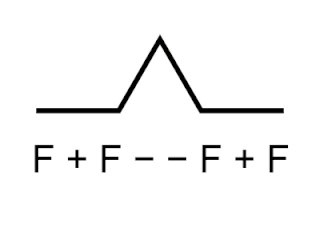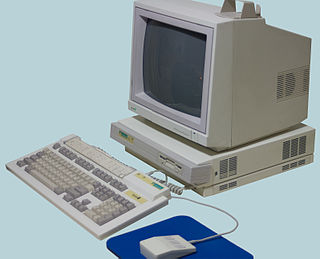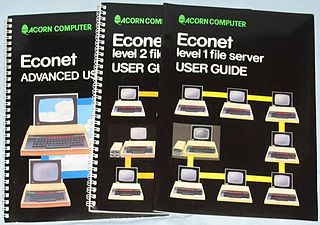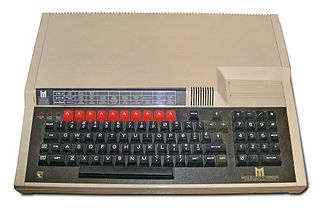Related Research Articles

The Acorn Electron was a lower-cost alternative to the BBC Micro educational/home computer, also developed by Acorn Computers Ltd, to provide many of the features of that more expensive machine at a price more competitive with that of the ZX Spectrum. It had 32 kilobytes of RAM, and its ROM included BBC BASIC II together with the operating system. Announced in 1982 for a possible release the same year, it was eventually introduced on 25 August 1983 priced at £199.

Logo is an educational programming language, designed in 1967 by Wally Feurzeig, Seymour Papert, and Cynthia Solomon. Logo is not an acronym: the name was coined by Feurzeig while he was at Bolt, Beranek and Newman, and derives from the Greek logos, meaning word or thought.
The NS32000, sometimes known as the 32k, is a series of microprocessors produced by National Semiconductor. The first member of the family came to market in 1982, briefly known as the 16032 before becoming the 32016. It was the first general-purpose microprocessor on the market that used 32-bit data throughout: the Motorola 68000 used 32-bit data but had a 16-bit ALU and thus took twice as long perform many operations. However, the 32016 contained many bugs and often could not be run at its rated speed. These problems, and the presence of the otherwise similar 68000 which had been available since 1980, led to little use in the market.

BBC BASIC is a version of the BASIC programming language released in 1981 as the native programming language for the BBC Micro home/personal computer, providing a standardized language for a UK computer literacy project of the BBC. It was written mainly by Sophie Wilson.

Acorn Computers Ltd. was a British computer company established in Cambridge, England, in 1978. The company produced a number of computers which were especially popular in the UK, including the Acorn Electron and the Acorn Archimedes. Acorn's BBC Micro computer dominated the UK educational computer market during the 1980s.

Risc PC was a range of personal computers launched in 1994 by Acorn and replaced the preceding Archimedes series. The machines had a unique architecture unrelated to IBM PC clones and were notable for using the Acorn developed ARM CPU which is now widely used in mobile devices.

Acorn Archimedes is a family of personal computers designed by Acorn Computers of Cambridge, England. The systems are based on Acorn's own ARM architecture processors and the proprietary operating systems Arthur and RISC OS. The first models were introduced in 1987, and systems in the Archimedes family were sold until the mid-1990s.
ARX was an unreleased Mach-like operating system written in Modula-2+ developed by Acorn Computers Ltd in the Acorn Research Centre (ARC) United Kingdom (UK) and later by Olivetti - which purchased Acorn - for Acorn's new Archimedes personal computers based on the ARM architecture reduced instruction set computer (RISC) central processing unit (CPUs).
Acornsoft was the software arm of Acorn Computers, and a major publisher of software for the BBC Micro and Acorn Electron. As well as games, it also produced a large number of educational titles, extra computer languages and business and utility packages – these included word processor VIEW and the spreadsheet ViewSheet supplied on ROM and cartridge for the BBC Micro/Acorn Electron and included as standard in the BBC Master and Acorn Business Computer.

RISC iX is a discontinued Unix operating system designed to run on a series of workstations based on the Acorn Archimedes microcomputer. Heavily based on 4.3BSD, it was initially completed in 1988, a year after Arthur but before RISC OS. It was introduced in the ARM2-based R140 workstation in 1989, followed up by the ARM3-based R200-series workstations in 1990.

Econet was Acorn Computers's low-cost local area network system, intended for use by schools and small businesses. It was widely used in those areas, and was supported by a large number of different computer and server systems produced both by Acorn and by other companies.

The BBC Master is a home computer released by Acorn Computers in early 1986. It was designed and built for the British Broadcasting Corporation (BBC) and was the successor to the BBC Micro Model B. The Master 128 remained in production until 1993.
The Disc Filing System (DFS) is a computer file system developed by Acorn Computers, initially as an add-on to the Eurocard-based Acorn System 2.
The Acorn Business Computer (ABC) was a series of microcomputers announced at the end of 1983 by the British company Acorn Computers. The series of eight computers was aimed at the business, research and further education markets. Demonstrated at the Personal Computer World Show in September 1984, having been under development for "about a year" and having been undergoing field trials from May 1984, the range "understandably attracted a great deal of attention" and was favourably received by some commentators. The official launch of the range was scheduled for January 1985.

The Machine Operating System (MOS) or OS is a discontinued computer operating system (OS) used in Acorn Computers' BBC computer range. It included support for four-channel sound, graphics, file system abstraction, and digital and analogue input/output (I/O) including a daisy-chained expansion bus. The system was single-tasking, monolithic and non-reentrant.

A BBC Micro expansion unit, for the BBC Micro is one of a number of peripherals in a box with the same profile and styling as the main computer.
Shadow RAM, on the Acorn BBC Micro, Master-series and Acorn Electron microcomputers is the name given to a special framebuffer implementation to free up main memory for use by program code and data. Some implementations of shadow RAM also permit double-buffered graphics.
In computing, the Tube is the expansion interface and architecture of the BBC Microcomputer System which allows the BBC Micro to communicate with a second processor, or coprocessor.
Torch Computers Ltd was a computer hardware company with origins in a 1982 joint venture between Acorn Computers and Climar Group that led to the development of the Communicator or C-series computer, a system based on the BBC Micro with a Z80 second processor and integral modem, intended as a viewdata terminal.

The British Broadcasting Corporation Microcomputer System, or BBC Micro, is a series of microcomputers and associated peripherals designed and built by Acorn Computers in the 1980s for the BBC Computer Literacy Project. Designed with an emphasis on education, it was notable for its ruggedness, expandability, and the quality of its operating system. An accompanying 1982 television series, The Computer Programme, featuring Chris Serle learning to use the machine, was broadcast on BBC2.
References
- ↑ Panos, Chris's Acorns
- ↑ "Centre for Computing History".
- ↑ "Chris's Acorns: Panos".
- Notes
- Panos Guide to Operations. Acorn Computers. July 1985. ISBN 0-907876-43-9.
- Technical Reference Manual for Panos. Acorn Computers. June 1986.
- Acorn Cambridge Workstation. Acorn Computers.